Executive summary
Annual Report 2024
In 2024 we welcomed the results of the formal evaluation of our research activities over the years 2017-2022, according to the Strategy Evaluation Protocol (SEP) of the VSNU, KNAW and NWO. The international SEP evaluation committee that visited our institute in November 2023 finds the quality of research conducted at HIMS very high and sees an institute with excellent viability. Moreover, the committee is positive about the institute’s societal impact. This results not only from many contacts with industry and the number of spin-offs seeking to achieve valorisation of HIMS research. It is also reflected in our research extending to areas like cultural heritage and law enforcement. The committee further noticed an open and supportive research culture, resulting in a strong community that successfully trains independent, young researchers.
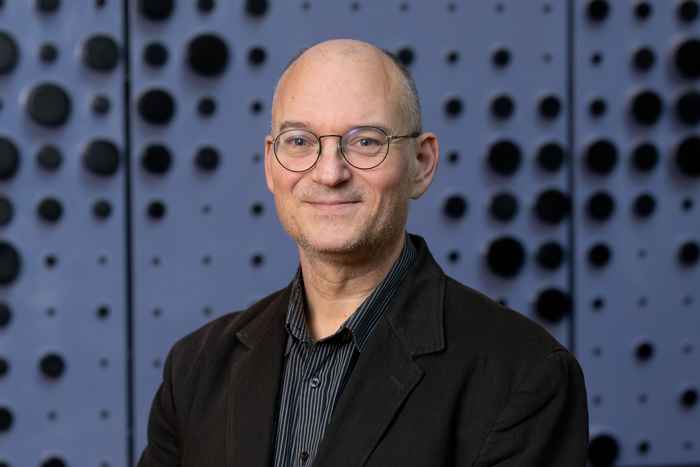
The process of self-evaluation was overseen by Wybren Jan Buma, who stepped down as scientific director of our institute in June 2024 when his term formally ended. We thank him for his unwavering commitment and wish him all the best now that he can return his focus to science. Buma was succeeded by Prof. Bas de Bruin who is committed to guiding our institute in doing great science and making valuable contributions to society: “The valuable recommendations of the SEP committee will help HIMS to stay relevant, secure funding and to educate the next generation of scientists.”
HIMS is currently implementing these recommendations to further strengthen the performance of HIMS and continue its high-quality research. This includes refining the institute’s strategic plans, clarifying the guidelines regarding PhD graduation, striving for a greater uniformity with regards to research data management, increasing the autonomy of the diversity team and facilitating grant applications to secure instrument funding.
In 2024 we saw many researchers at our institute acquiring external grants such as the € 320,000 Veni grants for Dr Alberto Pérez de Alba Ortíz and Dr Vasilis Tseliou. Dr Eva Meeus was awarded an NWO Rubicon grant to work as a postdoc for two years at ETH Zurich, Switzerland. Several of our researchers participate in the national research effort HyPRO, receiving in total around €1,6 million in funding. With a total budget of over €50 million, it aims to boost development and implementation of technology for the sustainable production of hydrogen. Dr Amanda Garcia of electrochemistry and electrocatalytic synthesis represents our institute in the consortium. Other HIMS participants are Dr Stephania Grecea, Dr Bernd Ensing and Prof. Joost Reek.
Our institute also participates in the ‘Advanced Nano-electrochemistry Institute Of the Netherlands’ or ANION, that was awarded Gravitation funding of 23.6 million euros. Formal ANION partner is Prof. Peter Bolhuis of Computational Chemistry. Other contributions are made by Prof. Evert Jan Meijer, Dr Bernd Ensing, Dr Amanda Garcia, and Prof. Sander Woutersen.
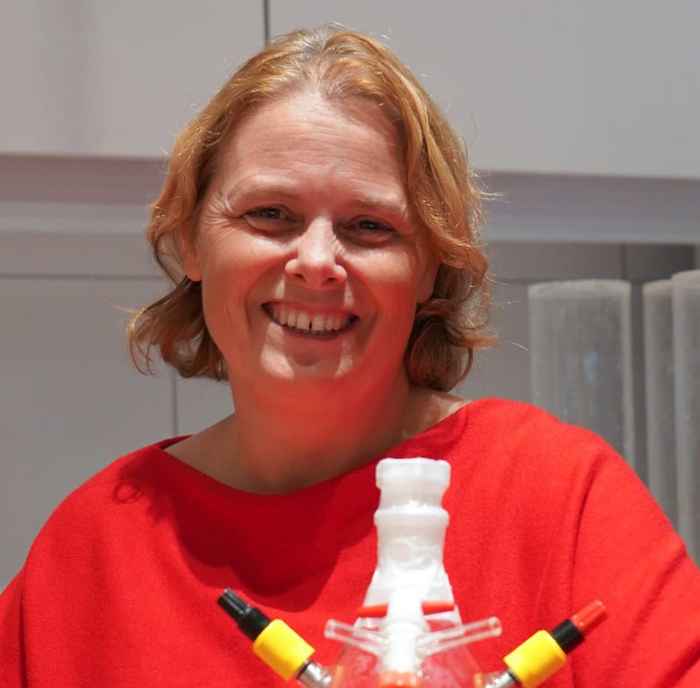
Dr Annemieke Petrignani of the Astro Chemistry laboratory is part of the PRELIFE consortium that was awarded funding of 6.7 million euros. Petrignani will lead research into the polymerisation of prebiotic building blocks on water-rich worlds and is involved as partner in six other projects that explore the emergence of building blocks and functionalities of life and their key conditions.
Dr Jocelyne Vreede was awarded funding as part of the Marie Curie doctoral network MeChaNiSM. This will enable her to appoint two PhD students who will work on molecular simulation methods for nucleic acids (DNA and RNA). Vreede also obtained funding from the NWO ENW-XL Open Competition scheme to appoint a PhD researcher for molecular simulations of the interaction between light-driven molecular motors and DNA molecules.
The Biocatalysis group led by Dr Francesco Mutti was awarded a €200,000 post-doctoral fellowship grant as part of the EU Marie Skłodowska-Curie actions. It will enable Dr Natalia Kwiatos to work for two years on the design and development of a yeast platform for the synthesis of chiral amines through enzymatic cascades.
Finally, the UvA Faculty of Science has awarded four proposals from HIMS researchers as part of its efforts to establish a Molecular and Materials Design (MMD) Technology hub. Three other MMD proposals involve contribution of HIMS researchers, giving our institute a share in seven of the nine MMD projects that receive funding from 50,000 up to 150,000 euros.
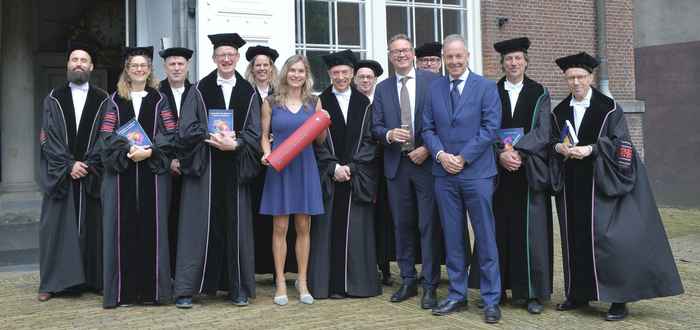
In total, 19 young researchers obtained their PhD at our institute of which three received their doctorate with the distinction 'cum laude': Dr Mirjam de Bruin – Hoegée and Dr Sefan Zondag. A number of 290 peer-reviewed publications resulted from our research, including 16 joint publications from collaborating HIMS groups, often involving interdisciplinary collaborations across the different HIMS themes.
We have seen a number of noteworthy changes in the HIMS staff. Prof. Bas de Bruin took over the helm as director of the institute, succeeding Prof. Wybren Jan Buma. We also welcomed Dr Stephan van Duren as our new institute manager. Dr Hong Zhang (Molecular Photonics) was appointed full professor of Bionanophotonics, focusing on the design and development of (bio-) functional light-responsive nanomaterials, and on the photophysics and photochemistry of spatially confined systems. Dr Chris Slootweg (Synthetic Organic Chemistry) was appointed full professor of Circular Chemistry, focus on new concepts and processes that will help rendering chemistry sustainable and circular. Veni laureate Bettina Baumgartner joined our institute as an assistant professor with the Research Priority Area ‘Sustainable Chemistry’, working at the research group for Homogeneous, Supramolecular and Bio-inspired Chemistry.
In 2024, HIMS researchers received notable awards and recognitions. Prof. Sander Woutersen and Tess Heeremans were among the winners of the 2024 Chemistry IgNobel Prize for research conducted in cooperation with the Institute of Physics, where the behaviour of ‘drunk worms’ was investigated as a particular form of active matter. Prof. Gert-Jan Gruter of Industrial Sustainable Chemistry was named Knight of the Order of the Netherlands Lion on 22 October. He was knighted in recognition of his exceptional contributions to sustainable chemistry and his commitment to innovation and societal impact.
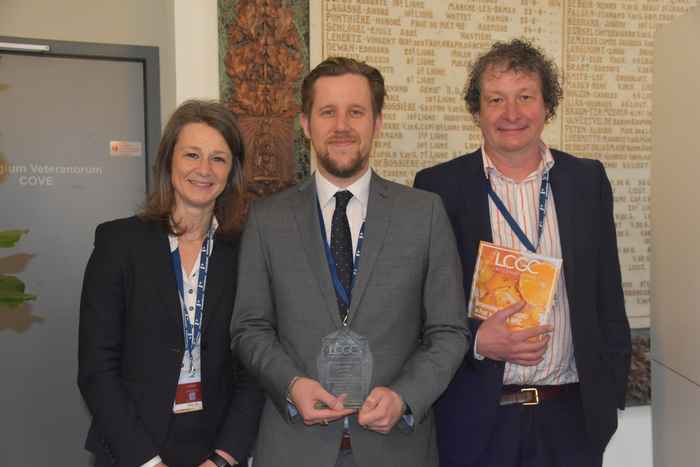
Dr Bob Pirok received the 2024 HTC Innovation Award, in recognition of his cutting-edge approaches to automate method development in analytical chemistry using machine learning and chemometrics. Associate professor Shiju N. Raveendran received a Prof. J.N. Mukherjee Memorial Award from the Indian Chemical Society, honouring his societally relevant research in Chemical Engineering and Green Chemistry. Prof. Gadi Rothenberg, Chair of Heterogeneous Catalysis and Sustainable Chemistry at the University of Amsterdam’s Van ‘t Hoff Institute for Molecular Sciences, has been appointed Distinguished Visiting Professor at Tsinghua University in Beijing.
Prof. Wim Noorduin was awarded the Stairway to Impact Prize by the Dutch Research Council NWO. It honours scientists who successfully translate their research findings into solutions that address societal challenges or generate economic benefits. Honours were also awarded to HIMS PhD students, for instance Chao Chun Hsu who received the Dick Stufkens Prize 2024 for best thesis and Kefan Wu who won a highly competitive ‘2023 Chinese Government Award for Outstanding Self-Financed Students Abroad’.
The valorisation of HIMS research and knowledge had several highlights worth sharing. Above we already mentioned the Stairway to Impact award for Prof. Wim Noorduin who developed a lead detection test whith his former PhD student Lukas Helmbrecht and co-founded the company Lumetallix to bring this to market. Our PhD graduates Dr Tijmen Bakker and Dr Klaas van Leest started the company Lightcore which aims to commercialize dye-sensitized solar cells (DSSCs) for small electronic devices, capturing energy from any light source. Dr Giulia Giubertoni and Prof. Sander Woutersen established the spin-off company InSpectT, producing a new spectroscopic device capable of sizing molecules and nanoparticles. They received €100,000 Proof-of-Concept funding from Innovation Exchange Amsterdam (IXA), the UvA technology-transfer office.
Dr Olivier Lugier was elected as Fellow of the Faculty of Impact of the Dutch Research Council NWO, offering him support in developing his concept of Innovative Core/Shell Nanoparticles for Biomedical Breakthroughs for which he already established the spin-off company Nano Hybrids.
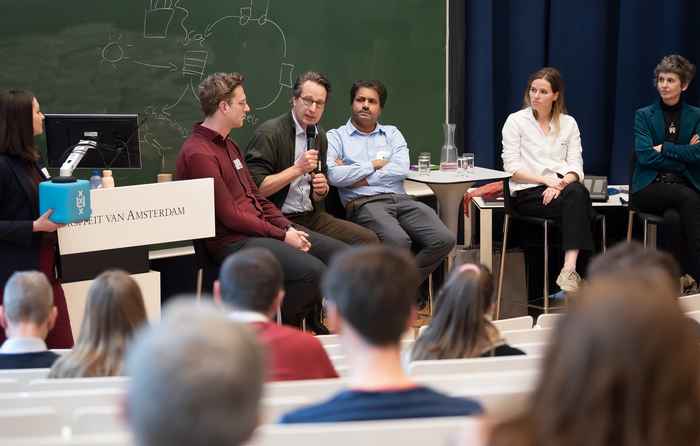
As an institute, we actively stimulate bringing together industry and academia. As an example, the 2024 edition of the annual ChemAI symposium, emphasizing the relevance of AI for chemical discovery, was a great success with around 250 participants. We also co-organised the Amsterdam Chemistry Innovation Day (ACID) that attracted some 300 academic researchers, industry representatives and students from across the Netherlands, participating in an inviting atmosphere and on equal terms.
Finally, we saw a number of valorisation-themed grants of 50,000 euros in the NWO Open Competition XS call. Dr Minghui Zhou sets out to design new organic nonlinear optics and investigate their data storage abilities. Dr Tomáš Šolomek will synthetize a new type of conjugated polymers inspired by the topology of carbon nanotubes. Dr Francesco Mutti will work on innovative biosensing methodologies aimed at detecting disease biomarkers in whole blood samples. Finally, Dr Stefania Grecea was awarded funding as part or the INDUCT project of Energy Innovation NL for the development of magnetic nanoparticles that can aid the recycling of laminated glass.